Monarchy
About Andrew Cusack
 Writer, web designer, etc.; born in New York; educated in Argentina, Scotland, and South Africa; now based in London.
Writer, web designer, etc.; born in New York; educated in Argentina, Scotland, and South Africa; now based in London. read more
News
Blogs
Reviews & Periodicals
Arts & Design
World
France
Mitteleuropa
Knickerbockers
Argentina
The Levant
Africa
Cape of Good Hope
Netherlands
Scandinavia
Québec
India
Muscovy
Germany
Academica
Prinsjesdag
The State Opening of the States-General of the Netherlands
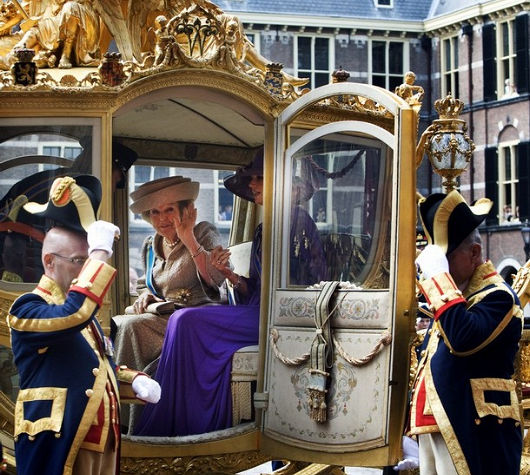
The third Tuesday in September beholds Prinsjesdag — the Day of the Princes — when the Queen of the Netherlands formally opens the annual parliamentary session of the States-General. Queen Beatrix arrives at the Ridderzaal (Knight’s Hall) of the Binnehof palace in the center of The Hague by means of the Gouden Koets (Golden Coach) presented to her predecessor Wilhelmina by the grateful burgers of the city of Amsterdam.
Swan Upping
The Palace has released this YouTube video on the ancient practice of swan upping.
Her Excellency
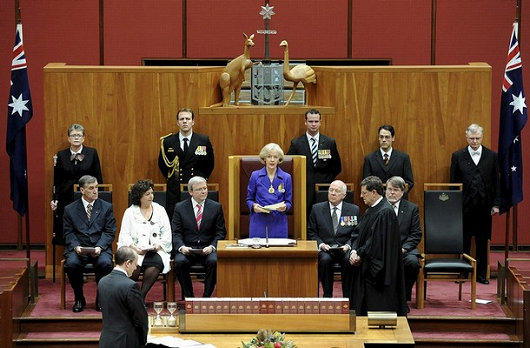
Quentin Bryce was yesterday sworn in as the Queen of Australia’s representative in her kingdom spanning that southerly continent.
The Tonga Coronation, 1967
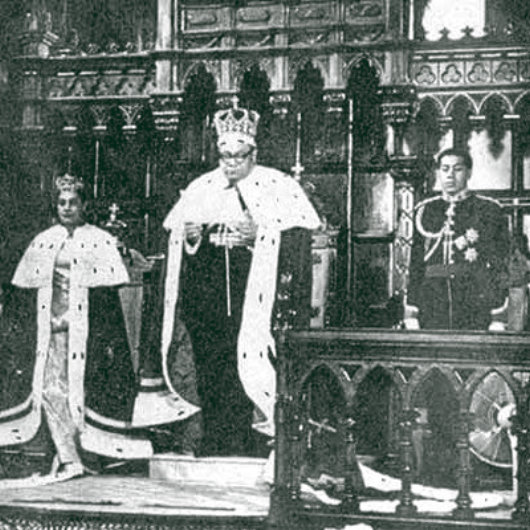
The 1967 coronation of the late King George IV of Tonga took place in the Chapel Royal. Unfortunately, the charming gothic revival structure burnt down some years ago, and so the latest coronation — that of George V — took place in the more spartan surroundings of the Centenary Church.
Elsewhere: See “islomaniac” Cheyenne Morrison’s coverage of the recent coronation at The Private Islands Blog.
A Colonel Inspects His Regiment
Nils Olav and the King of Norway’s Guards

The King of Norway’s Guards is the household regiment of that Scandinavian sovereign, but their honorary colonel resides in Edinburgh, where the regimental band often performs in the famous Military Tattoo held each summer. This year, the Colonel was honored with no less than a knighthood and took the opportunity of the unit’s presence in Edinburgh to inspect the regiment. Ordinarily, this would be an unremarkable event were it not for the fact that the Colonel is Nils Olav, a penguin currently in residence at the Edinburgh Zoo.
Monocled Monarch is the King of Fashion
Put Taft on a raft and forget Mr. Vorster: In terms of well-dressed heads of state, the King of Tonga is one of the last of his breed

 It’s an easily observable fact that, in terms of public attire, the heads of state of today generally leave much to be desired, yet the newly crowned King of Tonga (seen right) keeps up the sartorial tradition, not only of his ancestors, but of ours. George Tupou V (or Siaosi Taufa’ahau Manumataongo Tuku’aho Tupou V to give his full name) was crowned just a few weeks ago in a splendid ceremony in Nuku’alofa, the capital of “the Friendly Islands”.
It’s an easily observable fact that, in terms of public attire, the heads of state of today generally leave much to be desired, yet the newly crowned King of Tonga (seen right) keeps up the sartorial tradition, not only of his ancestors, but of ours. George Tupou V (or Siaosi Taufa’ahau Manumataongo Tuku’aho Tupou V to give his full name) was crowned just a few weeks ago in a splendid ceremony in Nuku’alofa, the capital of “the Friendly Islands”.
Though Tonga is certainly not the only monarchy in the Pacific — Japan, Australia, and New Zealand are the most prominent — it is one of the smallest and certainly one of the most traditional. So traditional, in fact, that it is on the naughty list of the CIA-linked “Freedom House” foundation. Tonga’s crime? That only a minority of the members of Tonga’s parliament, the Fale Alea, are directly elected. Of the 30 members, 9 are elected by a general electorate, 9 are elected by the nobility, 10 are members of the Privy Council, and 2 are governors appointed by the King. Curiously, Freedom House does not treat the United Kingdom the same as Tonga, despite the majority of parliamentarians being either directly appointed by the Crown or elected by hereditary lords — elected MPs consist of less than half of parliament.
The Pope at Government House

Pope Benedict XVI reviews the guard after being received by Maj. Gen. Jeffery, the Governor-General of Australia.
The Holy Saints of Russia
Russia remembers the murdered Tsar St. Nicholas II & his family

Christians in Russia yesterday solemnly remembered the brutal killing of the country’s Imperial Family by the Bolshevik revolutionaries 90 years earlier. Tsar Nicholas II, the Tsarina Alexandra, their daughters the Grand Duchesses Olga, Tatiana, Maria, and Anastasia, and the Tsarevich Alexei have all been added to the canon of saints of the Russian Orthodox Church. The Imperial Family were first officially recognized as saints by the Russian Orthodox Church outside the Soviet Union in 1981, and the Moscow patriarchate extended the same recognition in 2000.
The Annual Inspection

The ceremonial Changing of the Guard takes place at Rideau Hall, Canada’s viceregal palace, and Parliament Hill during the warmer months of the year. I recall with great fondness a summer trip to Ottawa when I was but a little boy and watching the Changing of the Guard on the green in front of the splendidly gothic parliament buildings. I instantly wanted to become a Canadian soldier, and pondered how many chocolate bars I could hide in the bearskin cap of a red-tunic’d guardsman. (Needless to say, I have not become a Canadian soldier, but Sa Majesté need only call and I would be at her service).
The Royal Military College of St. John

WHAT BETTER WAY to celebrate this, the feast of St. John the Baptist and the national day of Quebec, than to bring you news of the reëstablishment of the Collège militaire royal de Saint-Jean. The site in the town of Saint-Jean-sur-Richelieu was first put to a military use in 1666 when the French soldiers of the Carignan-Salières Regiment. The Collège militaire royal, however, was only founded in 1952 when it was inaugurated by the Rt. Hon. Vincent Massey, CC, CH, GCStJ, CD, PC as a classical college to increase the number of French-speaking officers in the Army, the Royal Canadian Navy, and the Royal Canadian Air Force.
“The Bridge of San Luis Rey”

New Spain never looked so good as in the 2004 film of Thornton Wilder’s novel The Bridge of San Luis Rey. This is no doubt partly because it wasn’t filmed in New Spain but in Old Spain (specifically in Toledo and Málaga).

Trooping the Colour

At the Queen’s Birthday Parade on Saturday, the colour was trooped by none other than a friend of mine and fellow St. Andrean who is now an officer in the Welsh Guards. He is seen here, at right, in the costume of Field Marshal the Earl Haig (sometime Lord Rector and then Chancellor of the University of St Andrews) for the annual Kate Kennedy Procession.
New vice-regal flag for New Zealand

Elizabeth II, Queen of New Zealand, recently approved a new vice-regal flag (above) for her governor-general, His Excellency the Honourable Anand Satyanand, PCNZM, QSO, KStJ. The flag has a blue field charged with the shield from the coat of arms of Her Majesty in Right of New Zealand, topped by St. Edward’s crown. The previous flag (below) was of the standard viceregal type for the British Commonwealth of Nations, depicting the crest from the British royal arms with a scroll bearing the name of the dominion.
His Excellency, incidentally, is the first Catholic governor-general in the history of New Zealand.

The Crown of Disenchantment
Over in Great Britain, the House of Commons recently passed the Human Fertilisation and Embryology Bill which, among other things, keeps the time limit on abortions at twenty-four weeks (in spite a hope that it would be lowered), authorizes the creation of “savior siblings (brothers and sisters deliberately created in a lab solely for their organs to be harvested for use by the already-born), and allows for the creation of animal-human hybrids. The British human rights activist James Mawdsley, famously jailed for over a year by the military junta in Burma, has asked opponents of the HFE Bill to sign a petition to Queen Elizabeth II imploring her to withhold the royal assent necessary for the Bill to become law.
Under the British constitution, a bill only becomes a law when it has received the assent of all three components of the British Parliament: the Commons, the Lords, and the Crown. The last time the Crown withheld consent was in 1708 when Queen Anne refused to sign the Scottish Militia Bill. Since that time, it has been an unspoken convention that should the Crown object to a piece of legislation, it should privately inform its ministers before the legislation is voted upon in order for it to be withdrawn, thus preventing the scandal of the Crown and the Commons appearing to be in disagreement. Despite this convention, however, the Crown still has the right to withhold consent, but merely neglects to exercise that right.
While the Crown has faded to near-irrelevance in the everyday workings of the British government, this was certainly not always the case, and the Crown has intervened in politics several times since Queen Anne’s refusal of assent in 1708. What follows are but a few twentieth-century examples.
In 1925, William Mackenzie King was Prime Minister of Canada with 99 Liberal MPs to the Conservative opposition’s 116. He was able to do this by forming a minority government with the support of the 24 MPs of the Progressive Party. A year later, Liberal MPs were implicated in a bribery scandal and so the Progressives having withdrawn their support for the minority government. As parliament debated a motion to censure the MPs involved, the Prime Minister asked Lord Byng, the Governor-General of Canada (and thus the direct representative of the Crown), to dissolve parliament and call a general election.
Lord Byng did not want it to appear that the Crown was allowing parliament to be dissolved in order to prevent the censure of government MPs and so used the royal prerogative and refused to call an election. The Conservatives, as the largest party in parliament (Lord Byng argued), should have a chance at forming a government instead. The Governor-General invited Arthur Meighen, leader of the Conservatives, to form a government instead, and Meighen agreed. This, in turn, infuriated not only the Liberals but also the Progressives, throwing the middle-man back into the Liberal camp. Meighen put his government up to a vote of confidence, lost it by one vote, and so resigned and asked the Governor-General to dissolve parliament and call an election, which Lord Byng duly did.
“I have to await the verdict of history to prove my having adopted a wrong course,” Lord Byng wrote, “and this I do with an easy conscience that, right or wrong, I have acted in the interests of Canada and implicated no one else in my decision.”
In 1931, when the Labour Prime Minister Ramsay MacDonald submitted his resignation to the King, George V took the unprecedented step of asking MacDonald to form a national government with the support of Conservatives and Liberal Members of Parliament. MacDonald lasted as Prime Minister until 1935, but Great Britain would not be governed by a single-party government again until 1945.
More recently, the Crown controversially intervened in Australian politics in 1975. Gough Whitlam’s Labor government commanded a majority in the House of Representatives but the opposition coalition of the Liberals and the National Country Party held sway in the Senate. It is traditional in Westminster-style systems that if a money supply bill fails to pass, the government falls with it. The Senate refused to vote on the annual Budget, in hopes of provoking Whitlam into calling a new election. Whitlam stubbornly refused, and the impasse grew as the weeks passed and, with no budget approved, it looked like the government of Australia would not be able to meet its financial obligations for the year.
Finally, the Governor-General of Australia, Sir John Kerr, used the royal prerogative to dismiss Whitlam as Prime Minister, asked the opposition leader Malcolm Fraser to take the job. Fraser formed a caretaker government solely to pass the appropriations bill then immediately called a new election which his own Liberal/National Country coalition won handily.
Such royal interventions, however, are not limited to the English-speaking world. Belgium’s King Baudouin I, a Charismatic Catholic and friend of Francisco Franco, famously refused to give assent to a bill liberalizing the kingdom’s abortion laws. The Prime Minister, Wilfred Martens, simply had the King declared temporarily unable to reign and the Government signed the Bill in place of the King (as is provided in the Belgian Constitution). Two days later, the Government declared the King able to reign once more, and all was back to normal (except for the unborn children killed thereafter, of course).
One of the great benefits of a monarchy is this: that the Crown act as a source of authority, free from democratic accountability, who is capable of blocking any egregious acts which the government of the day may attempt. The HFE Bill is the perfect example of a bill the Crown ought to reject, for the benefit of all the kingdom, most especially the unborn. Yet we can reasonably assume that Elizabeth II will grant her assent to this travesty of law nonetheless, as the current occupant of the throne has (ironically) so thoroughly and woefully imbibed the democratic spirit that she knows not how to fulfill her purpose and duty as Queen. (It is important to note that in neither the King-Byng affair nor the Whitlam-Kerr affair was the Governor General acting on the orders of the actual person who was the Crown at the time, but rather on their dutiful instinct as the local incarnation thereof). It is disappointing to those who are unflinching in their attempts to defend the British Monarchy that the British Monarchy insists on participating in, and sometimes urging on, the very sort of wickedness which we look to the Crown to protect us from. Alas, so far we have looked in vain.
Victoria Day – Fête de la Reine
The Official Birthday of the Queen of Canada
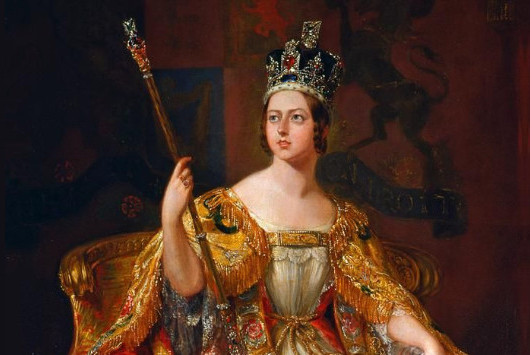
ELIZABETH II will have had, in her lifetime, more birthdays than Methuselah. This is because, in addition to the actual date of her birth, April 21, 1926, she has several different days which are designated as the Sovereign’s Official Birthday. In Britain, her birthday (which is the official national day of the United Kingdom) generally falls on the first or second Sunday in June and is the occasion of the ceremony of Trooping the Colour. Australia celebrates her birth on the first Monday in June with a public holiday, except for in Western Australia, where it is usually either the last Monday in September or the first Monday in October. This is the day when the latest members of the Order of Australia are announced. New Zealand also holds the Sovereign’s Birthday on the first Monday of June. Fiji is now a republic but Elizabeth II remains ‘Paramount Chief of Fiji’ and so a Monday in June is declared a holiday each year to commemorate her birth.
You call this journalism?
The decline of the British newspaper, continued
THE DAILY TELEGRAPH is asking its readers to believe that Gordon Brown is going to repeal the Act of Settlement barring Catholics from the throne and that furthermore this would make Franz, Duke of Bavaria the heir to the throne of England (c.f. “Act repeal could make Franz Herzog von Bayern new King of England and Scotland”, by Richard Alleyne and Harry de Quetteville, Daily Telegraph, 7 April 2008). In reality, the British Parliament does not have the authority to unilaterally repeal the Act, since by convention it must consult with the sixteen commonwealth realms. (Hence why Edward VIII had only the options of either dumping Wallis Simpson or giving up the throne; London had consulted the dominion governments and they said they would not accept Mrs. Simpson as Queen, end of story). Thus Gordon Brown would actually need to consult with and receive unanimous approval from the governments of Antigua and Barbuda, Australia, the Bahamas, Barbados, Belize, Canada, Granada, Jamaica, New Zealand, Papua New Guinea, St. Kitts and Nevis, Saint Lucia, Saint Vincent and the Grenadines, the Solomon Islands, and Tuvalu, in addition to that of the United Kingdom.
Why, then, does the Daily Telegraph neglect to point out this necessity, seemingly obvious to anyone with more than a passing knowledge of the British constitution? Was the newspaper simply ignorant about the subject? If so, why did they choose to print an article about it without seeking further information from the plethora of readily-available sources? Or perhaps the newspaper did know but decided to ignore it in the interests of sensationalism? Either way, the proof is in the pudding: standards at the Daily Telegraph are not what they used to be.
Mourning in Vienna
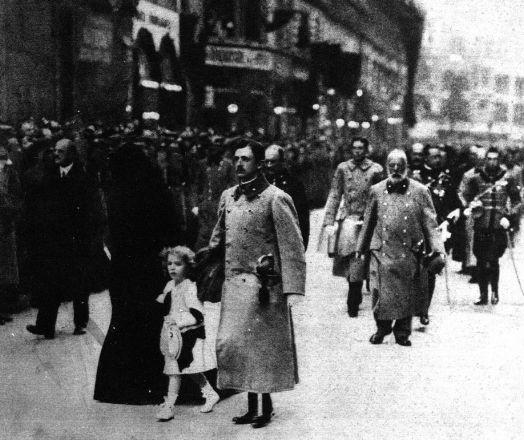
The Blessed Emperor Charles at the funeral of the late Emperor Franz Joseph, the saint’s great uncle, in November 1916. Between the Blessed Charles and his Empress, Zita of Bourbon-Parma, is Crown Prince Otto. Otto lives today, and is the head of the Hapsburg family.
Grant us the grace, with his intercession, to follow his example and serve the true cause of peace, which we find in the faithful fulfillment of Your holy will. We ask this through Jesus Christ our Lord, who lives and reigns with You and the Holy Spirit, one God, forever and ever.
Amen.
Category: Monarchy | Previously: Our Holy Emperor
Crown Prince Urges Prayers for Kosovo
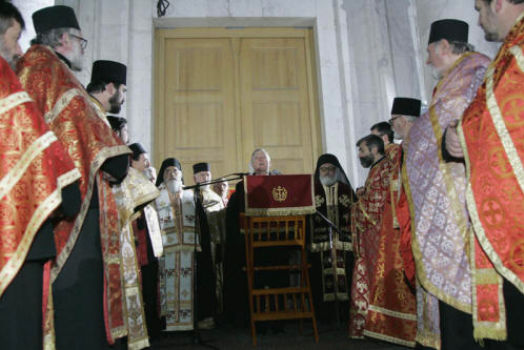
BELGRADE, 18 February 2008 – Their Royal Highnesses Crown Prince Alexander II and Crown Princess Katherine attended this afternoon at St. Sava Temple a public prayer for the salvation of the Serbian people in Kosovo and Metohija.
On behalf of His Holiness Patriarch Pavle of the Serbian Orthodox Church, the public prayer was led by His Eminence Archbishop Amfilohije of Cetinje and Metropolitan of Montenegro and Littoral, with the Vicar of His Holiness the Patriarch, His Grace Bishop of Hvostno Atanasije, priests and deacons from Belgrade churches. The performance of the Mokranjac Choir, in the presence of thousands of citizens who came to pray for the well-being for Kosovo’s Serbs and for Kosovo and Metohija, the heart and soul of Serbia, to remain in Serbia.
Many bishops of the Serbian Orthodox Church were present at the public prayer, as well as various officials: HE Mr. Slobodan Samardzic, Minister for Kosovo and Metohija, HE Mr. Radomir Naumov, Minister of Religion, HE Archbishop Eugenio Sbarbaro, Apostolic Nuncio, and others.
After the Holy Liturgy and the Holy Oration, His Eminence Metropolitan Amfilohije and His Royal Highness Crown Prince Alexander addressed the present.
In his speech, the Crown Prince emphasized:
“We are here today in the great Saint Sava Temple. In disbelief and horror. United in pain at a time of great tragedy for our people. I am deeply hurt and shocked. What has happened is a big injustice. What was thrust on our Serbian people is very painful and illegal.
“My wife and I visited Kosovo on Saturday. It was very emotional and sad seeing our dear people. His Grace Bishop Artemije of Raska and Prizren led the prayers in Saint Dimitri Church in Kosovska Mitrovica.
“I stand, as Karadjordjevic, with all my heart by our people in Kosovo and by our Serbian Orthodox Church.
“It is very important that we remain united. Our actions must be peaceful, dignified, diplomatic and legal. We all pray to dear God for negations to continue and that a solution and compromise will be found. Therefore I appeal again for unity and responsibility of all our authorities. Violence or destruction of property will only damage our efforts. Therefore there must not be any violence – this is not Christian, it is not courageous, it is not in our tradition.
“May the Good Lord answer our prayers for the wellbeing of the Serbian people and all others!
“May Almighty God give our Serbia and our people strength and wisdom!”
Source: The Public Relations Office of HRH Crown Prince Alexander II
Archduke Carl Ludwig, 1918-2007
Son of Blessed Charles, U.S. Army Veteran, Fought at Normandy
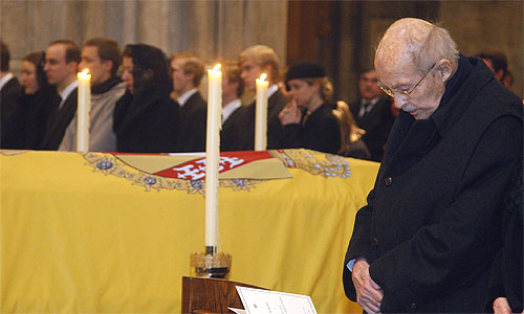
A READER WAS kind enough to bring to my attention the recent death of His Imperial & Royal Highness, Archduke Carl Ludwig Maria Franz Joseph Michael Gabriel Antonius Robert Stephan Pius Gregor Ignatius Markus d’Aviano of Austria, one of the sons of Blessed Charles, the last (up to this point) Emperor of Austria, Apostolic King of Hungary, King of Bohemia, etc. Carl Ludwig’s birth in 1918 was hailed with a 101-gun salute from the imperial field artillery, but the Habsburgs were soon overthrown by a republican element in Vienna and forced into exile. The Archduke studied at the University of Louvain until the outbreak of the Second World War, when the Habsburgs fled to the safety of Quebec.
There, the family were so poor they sometimes had to survive off a soup the Empress Zita cheerfully prepared from dandelions picked in the park. Carl Ludwig, however, was able to complete his studies at the Université Laval, the oldest university in Canada, before being allowed to join the United States Army in 1943. On June 6, 1944, he took part in the D-Day landings in Normandy, and later became aide-de-camp to the Comte de Hauteclocque, a general in the Free French Forces (later known as Maréchal Leclerc), and served with the Algerian spahis. He was discharged from the U.S. Army with the rank of Major in 1947, and in 1950 married Princess Yolande de Ligne.
The Queen’s Christmas Message 2007
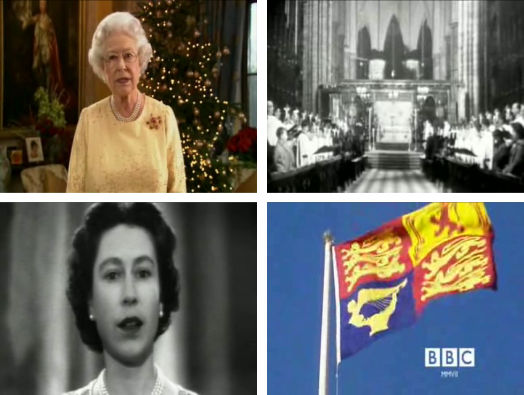
Available here at YouTube.
Search
Instagram: @andcusack
Click here for my Instagram photos.Most Recent Posts
- Faithful Shepherd of the Falklands April 8, 2025
- Articles of Note: 8 April 2025 April 8, 2025
- Proportionality Destroys Representation April 8, 2025
- Sag Harbor Cinema March 26, 2025
- Teutonic Takeover March 10, 2025
Most Recent Comments
Book Wishlist
Monthly Archives
Categories


